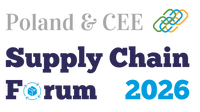SUSTAINABLE SUPPLY CHAIN & OPERATIONS STAGE
Day 2 April 15
09:00–10:40
BLOCK 1 - SUSTAINABILITY UNDER OPERATIONAL LOAD
09:00 - 09:30
PANEL
Sustainability obligations intensify faster than operational capacity can absorb
- Exploring how new sustainability requirements accumulate across stores, warehouses and partners without proportional capacity increases.
- Highlighting where uneven readiness turns the weakest operational link into a system-wide bottleneck.
- Synchronising workload thresholds, partner responsibilities and execution pacing into one operating rhythm, mitigating overload before failures cascade.
09:30 - 09:50
Sustainability data breaks where execution processes lack consistency
- Exploring how sustainability metrics depend on routine capture of operational events across daily store and warehouse activities.
- Highlighting where inconsistent definitions, manual handling and delayed recording undermine data reliability under pressure.
- Harmonising event capture rules, data ownership and validation checkpoints into one execution layer, normalising sustainability data as part of daily operations.
09:50 - 10:10
Operational strain emerges before sustainability delivers measurable resilience
- Exploring how new sustainability tasks add steps, checks and handoffs into already stretched operational routines.
- Highlighting where exception volumes rise faster than teams can absorb through existing processes and roles.
- Rebalancing task design, exception thresholds and support capacity into one workload model, absorbing strain before stability erodes.
10:10 - 10:40
PANEL
Sustainability initiatives fail when sequencing ignores operational capacity limits
- Exploring how overlapping sustainability initiatives collide with daily execution demands and limited operational headroom.
- Highlighting where poor sequencing pushes additional workload into fragile processes and increases exception frequency.
- Prioritising stabilisation steps, initiative order and execution pacing into one rollout logic, preventing overload before systemic failure.
10:40 - 11:00
Coffee Break
11:00–13:00
BLOCK 2 - CIRCULAR OPERATIONS AT SCALE
11:00 - 11:30
PANEL
Reverse flows destabilise operations when circular transitions begin before systems adapt
- Exploring how the introduction of reverse flows adds volume, handling steps and uncertainty into established store and distribution routines.
- Highlighting where parallel compliant and non-compliant flows overload backrooms, transport links and receiving processes.
- Coordinating intake rules, handling capacity and routing priorities into one transition model, containing disruption during early circular rollout.
11:30 - 11:50
Circular systems stall when costs and benefits fall on different actors
- Exploring how circular initiatives redistribute costs, handling effort and risk across suppliers, operators and retailers.
- Highlighting where misaligned incentives discourage participation and slow operational adoption of closed-loop processes.
- Realigning cost allocation rules, performance measures and responsibility boundaries into one operating logic, restoring momentum in circular execution.
11:50–12:10
Closed-loop systems fail when behaviour collides with operational constraints
- Exploring how everyday handling behaviour shapes the volume, quality and timing of returned materials in closed-loop operations.
- Highlighting where convenience-driven actions create contamination, delays and rework at store and backroom interfaces.
- Embedding behaviour-aware handling rules, acceptance criteria and training cues into one execution model, reducing disruption across reverse flows.
12:10–12:30
Parallel flows create instability before circular systems reach steady state
- Exploring how operating with old and new flows in parallel multiplies handling paths, decisions and training demands.
- Highlighting where uncertainty around acceptance rules and routing increases errors and slows execution during rollouts.
- Synchronising transition timing, training coverage and exception handling into one rollout cadence, stabilising operations as systems mature.
12:30 - 13:00
PANEL
Circularity stalls when operating models lag behind ecosystem complexity
- Exploring how closed-loop ambitions rely on multiple actors whose capabilities and incentives evolve at different speeds.
- Highlighting where weakest-link dependencies and fragmented responsibilities prevent circular processes from stabilising.
- Redesigning operating roles, interface ownership and performance signals into one system view, aligning circular execution across the network.
13:00 - 14:00
Lunch
14:00 - 16:00
BLOCK 3 - DECARBONISING UNDER CONSTRAINT
14:00 - 14:30
Decarbonisation ambition accelerates while transport and energy systems lag behind
- Exploring how rising decarbonisation expectations translate into operational requirements across transport fleets and energy supply.
- Highlighting where infrastructure readiness, asset availability and supplier capability constrain feasible execution timelines.
- Sequencing targets, asset transitions and service commitments into one feasibility pathway, preventing premature disruption.
14:30–14:50
Low-carbon transport choices introduce volatility into cost and service performance
- Exploring how alternative fuels and new energy contracts alter operating costs and service predictability.
- Highlighting where price swings, limited availability and route constraints increase exposure during transition phases.
- Balancing fuel selection, route design and contingency buffers into one operating approach, dampening volatility impacts.
14:50–15:10
Collaboration limits constrain decarbonisation when networks remain competitively fragmented
- Exploring how shared transport, pooling and coordination could reduce emissions through better asset utilisation.
- Highlighting where competitive boundaries, data reluctance and misaligned incentives prevent sustained collaboration.
- Linking collaboration scopes, data-sharing rules and utilisation targets into one cooperation framework, unlocking efficiency without eroding competitiveness.
15:10–15:30
Decarbonisation succeeds only within narrow feasibility and sequencing windows
- Exploring which transport and energy actions can realistically be executed within current infrastructure and asset constraints.
- Highlighting where cost exposure and service risk expand when decarbonisation steps are taken out of sequence.
- Sequencing initiatives, capacity commitments and fallback options into one transition window, controlling risk while progress continues.
15:30–16:00
PANEL
Feasibility defines the pace of decarbonisation when systems reach their limits
- Exploring how accumulated constraints across transport, energy and partners narrow realistic decarbonisation options.
- Highlighting where ambition outpaces execution capacity, creating exposure through cost, service and credibility risks.
- Anchoring decarbonisation commitments, capability readiness and review cadence into one feasibility frame, sustaining progress without overreach.
The contributors of the Sustainable Supply Chain & Operations Stage
- Marta Urbaniak Director of Quality and Environmental Management Department ŻABKA POLAND
- Monika Porębska Plenipotentiary for Sustainable Development and Responsible Business CEMENTOWNIA WARTA
- Agnieszka Kotlińska Expert, Grupa ESG Partners-Trainings for Business & Educations GRUPA ESG PARTNERS
- Mariusz Wawer Director of Governmental Relations & Sustainability 3M CEE 3M
- Marlena Babicka Global Head of Sustainability & ESG AVON
- Justyna Tomaszewska-Krygicz Manager DELOITTE ADVISORY SP. Z O.O. SP.K.
- Joanna Leoniewska-Gogola Circular Economy Leader DELOITTE
- Karol Poprawa Project Leader ESG LEROY-MERLIN POLSKA SP. Z O.O
- Maciej Zduńczyk Senior Manager Customer Service Commercial-EKA CHEP POLSKA
- Wojciech Iwulski Director of Climate Solutions UNIMOT
- Oliwia Tran Sustainability Manager GRUPA ŻYWIEC
- Jarosław Sobczyk Logistics Director JYSK
- Agata Frankiewicz CEO DEKO EKO
.png/picture-200?_=19b03554ac0)


.png/picture-200?_=19afebc9860)

.png/picture-200?_=19afeb83f18)

.png/picture-200?_=19afea99918)
.png/picture-200?_=19afeac19b8)